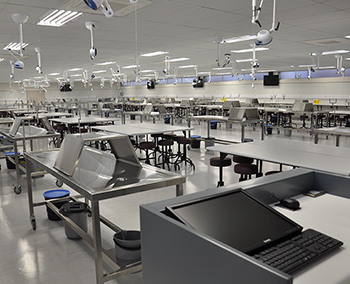Latest News Archive
Please select Category, Year, and then Month to display items
09 November 2018
|
Story Charlene Stanley
|
Photo Charlene Stanley
 Dr Tseliso Ntili, HOD of the Free State Department of Water and Sanitation, warns that pollution caused by mismanagement of municipal water-treatment works puts severe pressure on the province’s water security.
Dr Tseliso Ntili, HOD of the Free State Department of Water and Sanitation, warns that pollution caused by mismanagement of municipal water-treatment works puts severe pressure on the province’s water security.
“Despite our water challenges, Bloemfontein will never become a second Cape Town.” This firm assurance was given by Dr Tseliso Ntili, HOD of the Free State Department of Water and Sanitation, during his presentation at the recent regional seminar of the Faculty of Law’s Environmental Law Association.
The theme of the seminar was Water Quality and Water Security in Bloemfontein and was attended by staff and students from the Faculty of Law and the Faculty of Natural and Agricultural Sciences, as well as relevant role players from private, business, and government sectors.
Not enough water for city’s needs
Water restrictions in some form do seem to remain part of our future landscape though, as Dr Ntsili explained that the city’s current water yield of 218 megalitres per day still fell short of the demand of 259 megalitres per day.
Pollution and mismanagement at municipal level
He pointed out that a big cause for concern was that 75% of the Free State’s waste-water treatment works were dysfunctional. Housekeeping and security at these plants are often severely neglected. Yet, it is difficult for the Department of Water and Sanitation to act against offending municipalities.
“In intra-governmental disputes, the courts must be satisfied that organs of state have taken all reasonable steps to settle contentions – which can be a time-consuming process,” he explained.
Dr Ntsili said that the Caledon River System’s dwindling water levels due to low rainfall and siltation was also a concern, but that plans were underway to supplement the water supply to Bloemfontein via the Gariep Dam by 2026.
However, he warned that poor water management could drastically affect these long-term plans.
“If we can’t manage pollution, the cost will be high. Water security will be challenged, and we will have water shortages – not because of drought, but because of negligence.”
New modern dissection hall ensures optimal learning experience for medical students
2015-12-14

New Dissection Hall in the Francois Retief Building on the Bloemfontein Campus.
Photo: Stephen Collett
|
The School of Medicine in the Faculty of Health Sciences at the university opened its doors on 6 June 1969. Three years later, a dissection hall for anatomy training was added to the school. This year, because of the prospective growth in the number of medical students as well as in changing methods of teaching and training, a new modern Dissection Hall has been completed on the Bloemfontein Campus. This ensures that students receive an optimal learning experience during dissection tuition.
The Dissection Hall was built as a double-storey wing to the existing Francois Retief Building. Covering 733m², the new facility is on the first floor - the same level as the existing hall - to allow easy access between the two facilities. The ground floor, totalling 465m², houses various offices for 16 people.
The new hall has special lighting and modern equipment for the training of second-year medical students in dissection. The hall also has high-quality sound and computer equipment. A unique camera system allows students to follow dissection demonstrations on 10 screens in the hall. Dissection demonstrations are recorded, enabling lecturers to compile new visual aid material for teaching and learning.
The dissection programme for medical students is of critical importance, not only for acquiring anatomical knowledge, but also for developing critical skills in medical students.
The new hall is also used for clinical workshops and postgraduate teaching seminars, as well as workshops in orthopaedics (shoulder, hip, and knee), otorhinolaryngology, cardiothoracic surgery (valve and endoscopy), and anaesthesiology, among others.
Both present and future generations of medical students will benefit from this new world-class facility.